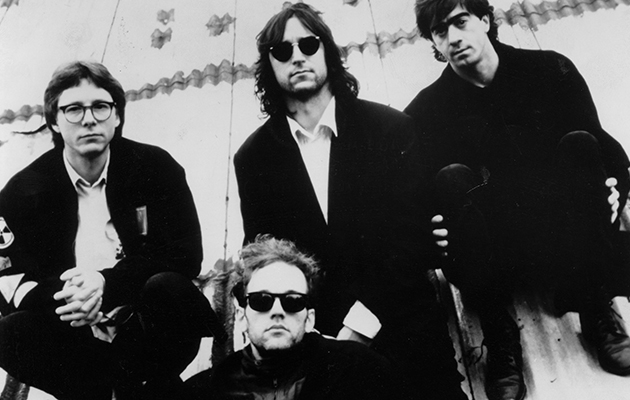David Stubbs invites Peter Buck, Mike Mills and Michael Stipe to talk about the 20 greatest singles of their major-label era. But which one does Stipe find “gross and disgusting”? And why does Mills think, “It’s amazing how many songs we’re playing now that we could have written yesterday�...
12 DAYSLEEPER
From the 1998 album Up. Released: October 1998.
Chart positions: UK No 6, US No 57
REM, and Stipe in particular, are compulsive changelings and especially so on their 1998 album Up – their first without Bill Berry. They struggled to bring on a musical metamorphosis, just as they were struggling to come to terms with the new imbalance of working as a threesome. Up is a fascinating, if incomplete exercise for REM, with its retro-futurist instrumental adornments and efforts to weave an Eno-esque ambient mist. “Daysleeper”, however, its ‘dream sequence’-style mid-section apart, indicates that, whatever new postures or approaches they choose to adopt, their work is haunted by recurrent themes. The see-saw musical action of the song and its lyric, which apparently concerns an office worker whose consciousness patterns are ravaged by the conditions of his work, struck a familiar chord with both REM fans (British ones particularly) and a relieved record company alike.
MIKE MILLS: Up was a very difficult album. We were trying to redefine ourselves and find out what the dynamic was between the three of us – every rule you’ve ever had about how to make a record has gone out the window. There were a lot of things going on at once. But I’m very proud of that record. It takes a while to listen to it, but I think if you give it enough time it rewards you very well. I like to think, anyway.
MICHAEL STIPE: Up is too long, we could have hacked a couple of songs off as B-sides, some of the performances are a little tentative, but the material’s strong.
MIKE MILLS: “Daysleeper” was the record company’s choice, they were the ones who picked it – I guess they couldn’t think of anything else. Sure, it’s the one that sounds most like REM, but picking a single that sounds exactly like the band, I’m not so sure that’s the way you should go about it. I think maybe you should pick something because it’s a great song, whether it sounds like the band or not. These days, when it comes to singles, we let the record company pick what they want – after all, they’re the ones that are going to have to do the work on it.
______________________
11 GET UP
From the 1988 album Green. Released: September 1989.
Chart positions: none
Although Stipe returns here to his familiar theme of dreams (“Dreams they complicate my life/Dreams they complement my life”), the song is actually addressed to the notoriously deaf-to-the-alarm-clock Mike Mills. Fiercely poppy and upbeat, it again sees REM and Stipe caught both pop-wise and politically between the attractions/imperatives of languishing on the margins or engaging directly with the pop mainstream. It’s as if they’re slapping themselves, trying to instil a new alertness into their act which is at odds with their natural, romantic tendencies. It reflects the push and pull of a band determined to be themselves, maintain their identity and integrity, yet reach out to a wider audience.
MIKE MILLS: Apparently, it’s about me. I wasn’t aware of this until the 1999 tour, when Michael told me and several thousand other people in an arena, onstage.
MICHAEL STIPE: Yeah, we’d written all these heavy, big songs and we wanted to do something that was a bit more bubblegum, you know, Orange Juice and The Monkees and The Banana Splits. So we did things like that and “Pop Song 89”.
PETER BUCK: Songs like “Get Up” are kind of big, dumb pop songs and that isn’t necessarily a bad thing. “Louie Louie” has probably got to be the best rockin’ song ever, and it’s dumb! It’s really dumb, it’s badly performed, and nothing’s beat it as far as I’m concerned.



